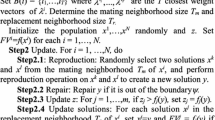Abstract
Multi-objective evolutionary algorithm based on decomposition (MOEA/D) has been successfully applied in solving multi-objective optimization problems. However, the performance of MOEA/D could be severely influenced by its parameter settings. In this paper, we introduce reinforcement learning into MOEA/D as a generic parameter controller. The resulting algorithm, reinforcement learning enhanced MOEA/D (RL-MOEA/D), is used to adaptively control the neighborhood size T and the differential evolutionary operators used in MOEA/D. RL-MOEA/D is first compared with MOEA/D with a random parameter control mechanism and MOEA/Ds with some fixed parameter settings on ten widely used multi-objective test instances. Then, RL-MOEA/D is compared with FRRMAB to show the effectiveness of the proposed algorithm. The experimental results indicate that RL-MOEA/D is very competitive. Finally, the characteristics of RL-MOEA/D are studied.








Similar content being viewed by others
References
Bosman, P.A.N., Thierens, D.: The balance between proximity and diversity in multiobjective evolutionary algorithms. IEEE Trans. Evol. Comput. 7(2), 174–188 (2003). https://doi.org/10.1109/TEVC.2003.810761
Consoli, P.A., Mei, Y., Minku, L.L., Yao, X.: Dynamic selection of evolutionary operators based on online learning and fitness landscape analysis. Soft. Comput. 20(10), 3889–3914 (2016)
Eiben, A.E., Horvath, M., Kowalczyk, W., Schut, M.C.: Reinforcement learning for online control of evolutionary algorithms. In: International Workshop on Engineering Self-Organising Applications, pp. 151–160 (2006)
Ginley, B.M., Maher, J., O’Riordan, C., Morgan, F.: Maintaining healthy population diversity using adaptive crossover, mutation, and selection. IEEE Trans. Evol. Comput. 15(5), 692–714 (2011). https://doi.org/10.1109/tevc.2010.2046173
Goncalves, R.A., Almeida, C.P., Pozo, A.: Upper confidence bound (UCB) algorithms for adaptive operator selection in MOEA/D. In: Evolutionary Multi-criterion Optimization, Lecture Notes in Computer Science, pp. 411–425. Springer, Cham (2015)
Karafotias, G., Eiben, A.E., Hoogendoorn, M.: Generic parameter control with reinforcement learning. In: Conference on Genetic and Evolutionary Computation, pp. 1319–1326 (2014)
Karafotias, G., Hoogendoorn, M., Eiben, A.: Parameter control in evolutionary algorithms: trends and challenges. IEEE Trans. Evol. Comput. 19(2), 167–187 (2015). https://doi.org/10.1109/TEVC.2014.2308294
Karafotias, G., Hoogendoorn, M., Eiben, A.E.: Evaluating reward definitions for parameter control. In: European Conference on the Applications of Evolutionary Computation, pp. 667–680 (2015)
Li, K., Fialho, A., Kwong, S., Zhang, Q.: Adaptive operator selection with bandits for a multiobjective evolutionary algorithm based on decomposition. IEEE Trans. Evol. Comput. 18(1), 114–130 (2014). https://doi.org/10.1109/TEVC.2013.2239648
Lin, Q., Liu, Z., Yan, Q., Du, Z., Coello, C.A.C., Liang, Z., Wang, W., Chen, J.: Adaptive composite operator selection and parameter control for multiobjective evolutionary algorithm. Inf. Sci. 339, 332–352 (2016). https://doi.org/10.1016/j.ins.2015.12.022
Muller, S.D., Schraudolph, N.N., Koumoutsakos, P.D.: Step size adaptation in evolution strategies using reinforcement learning. In: Proceedings of the World on Congress on Computational Intelligence, vol. 1, pp. 151–156. IEEE Computer Society, Los Alamitos, CA, USA (2002). https://doi.org/10.1109/CEC.2002.1006225
Rost, A., Petrova, I., Buzdalova, A.: Adaptive parameter selection in evolutionary algorithms by reinforcement learning with dynamic discretization of parameter range. In: Genetic and Evolutionary Computation Conference Companion, pp. 141–142 (2016)
Sutton, R., Barto, A.: Reinforcement Learning: An Introduction. MIT Press, Cambridge (1998)
Sutton, R.S.: Learning to predict by the methods of temporal differences. Mach. Learn. 3(1), 9–44 (1988). https://doi.org/10.1023/A:1022633531479
Venske, S.M., Gonçalves, R.A., Delgado, M.R.: ADEMO/D: multiobjective optimization by an adaptive differential evolution algorithm. Neurocomputing 127(127), 65–77 (2014)
Wong, Y.Y., Lee, K.H., Leung, K.S., Ho, C.W.: A novel approach in parameter adaptation and diversity maintenance for genetic algorithms. Soft. Comput. 7(8), 506–515 (2003)
Zhang, H., Lu, J.: Adaptive evolutionary programming based on reinforcement learning. Inf. Sci. 178(4), 971–984 (2008). https://doi.org/10.1016/j.ins.2007.09.026
Zhang, J., Sanderson, A.C.: JADE: adaptive differential evolution with optional external archive. IEEE Trans. Evol. Comput. 13(5), 945–958 (2009)
Zhang, Q., Li, H.: MOEA/D: a multiobjective evolutionary algorithm based on decomposition. IEEE Trans. Evol. Comput. 11(6), 712–731 (2007). https://doi.org/10.1109/TEVC.2007.892759
Zhang, Q., Liu, W., Li, H.: The performance of a new version of MOEA/D on CEC09 unconstrained MOP test instances. In: IEEE Congress on Evolutionary Computation, 2009. CEC ’09, pp. 203–208 (2009). https://doi.org/10.1109/CEC.2009.4982949
Zhang, Q., Zhou, A., Zhao, S., Suganthan, P.N., Liu, W., Tiwari, S.: Multiobjective optimization test instances for the CEC 2009 special session and competition. University of Essex, Colchester, UK and Nanyang Technological University, Singapore, Special Session on Performance Assessment of Multi-Objective Optimization Algorithms, Technical Report (2008)
Zhao, S.Z., Suganthan, P., Zhang, Q.: Decomposition-based multiobjective evolutionary algorithm with an ensemble of neighborhood sizes. IEEE Trans. Evol. Comput. 16(3), 442–446 (2012). https://doi.org/10.1109/TEVC.2011.2166159
Zitzler, E., Thiele, L.: Multiobjective evolutionary algorithms: a comparative case study and the strength Pareto approach. IEEE Trans. Evol. Comput. 3(4), 257–271 (1999). https://doi.org/10.1109/4235.797969
Acknowledgements
This work is supported by the National Natural Science Foundation of China under grant number 61571346. The authors would like to thank the reviewers and the editor for their comments for improving this paper.
Author information
Authors and Affiliations
Corresponding author
Rights and permissions
About this article
Cite this article
Ning, W., Guo, B., Guo, X. et al. Reinforcement learning aided parameter control in multi-objective evolutionary algorithm based on decomposition. Prog Artif Intell 7, 385–398 (2018). https://doi.org/10.1007/s13748-018-0155-7
Received:
Accepted:
Published:
Issue Date:
DOI: https://doi.org/10.1007/s13748-018-0155-7




